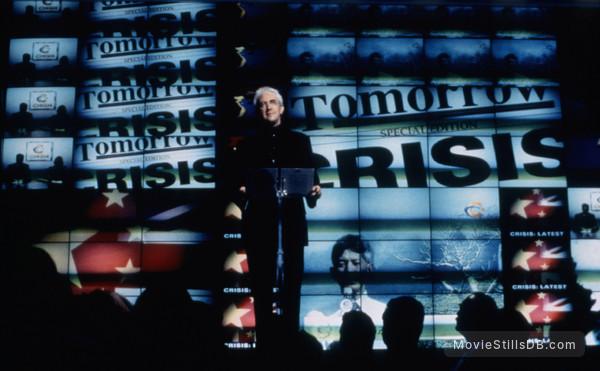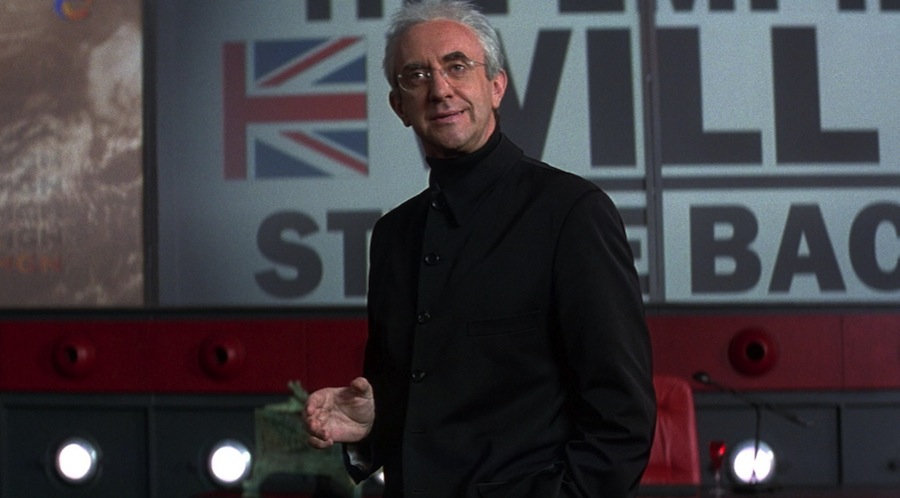The Pierce Brosnan James Bond films are known for their terrible one-liners, ultra-suave leading man and a lot of camp, not to mention that the GoldenEye video game is forever immortalized. But one thing the movies aren’t known for is their nuance and cleverness, relying heavily on global opinion as to who the next major villain would be (Russian one day, North Korean the next). But Tomorrow Never Dies had a very interesting villain, one who was less Dr. Evil and more Rupert Murdock.
The primary plot of Tomorrow Never Dies is pretty run-of-the-mill. The British and Chinese are on the cups of war and it’s up to 007 himself, James Bond, to gather intelligence to stop the two superpowers from duking it out. The potential war is being masterminded by one Elliot Carver, played by the excellent Jonathan Pryce, who uses some illicit black market tech to scramble a ship’s GPS transponder to make it appear like it was elsewhere in the ocean. From there, Carver and his squad would sink ships with his submarine, with the ships being found in hostile waters on the scanner. The Chinese and British, respectively, would then blame each other for the attack with the ultimate goal leading to open war between the two superpowers. The world is an intense place right now, thanks to Russia’s invasion of Ukraine and China’s uneasy alliance with said aggressor while also antagonizing Taiwan. So while Tomorrow Never Dies never commentates on the political nuance of global superpowers, it was seemingly ahead of its time in terms of how we consume media.
The reason for this is that Elliot Carver is a media baron and opts to manipulate world events in order to boost TV ratings and sell newspapers (bear in mind, this was the late 90s), with particular emphasis on an exclusivity deal in China for his company. At first glance, his plan sounds absurd, but considering how the world has changed in recent years, thanks largely to social media, Carver’s plan doesn’t seem so cartoony anymore. Controlling the narrative has always been part of the media and the news, but now with social media and digital marketing, the real enemy is disinformation and “fake news”, something that Carver peddles and has been weaponized heavily in the past few years.
Carver’s philosophy is a clear satire (I think at least) of Rupert Murdock, the owner of News Corp (which in turn owns Fox News and The New York Post, among many other companies). Tomorrow Never Dies’ writer, Bruce Feirstein, cites however that Carver is actually based on Robert Maxwell, who was a British media mogul whose death in real life mirrors that of Carver’s in the movie. Either way, Carver has roots in real-life men and his actions and mindset have echoed in the 2020s. Film & Spirit’s co-host Fred even compared his narcissistic personality and obsession over news ratings to one Donald Trump, proving to us again that Carver was a mogul more realistic than we once believed.

The past few years have been, memorable, to say the least. From the pandemic to the war in Ukraine to economic woes to the numerous, ongoing charges laid against former President Trump, we have no shortage of major news stories as of late. But we’ve also seen how rampant misinformation can be. Fox News, in particular, has been heavily criticized over the years for falsifying news stories or shying away from major events in order to suit their politics, or perhaps more importantly, pander to their demographic. Carver is the embodiment of a lot of things we’ve seen in recent years, from blatant lies from politicians to push a narrative to disinformation campaigns being spread on social media about Russia’s invasion of Ukraine to Elon Musk’s acquisition of Twitter, now known as X, and changing a lot of the rules surrounding free-speech and censorship.
X is an interesting angle though, as the social media platform didn’t exist when Tomorrow Never Dies came out. But Carver’s company, The Carver Media Group (which owns the Tomorrow newspaper), is designed to be a 24/7 news machine, constantly pumping out information for its viewers. That’s an awful lot of content and there are surely slow days in the news, so altering or straight-up fabricating stories, which in turn will get picked up by other agencies, nets them more exposure. Sound familiar? Fundamentally, this is the concept of social media, with tweets (X’s…ugh), keeping a story alive much longer. But much like broken telephone, the story risks getting muddled as more users read up on it.

Carver is an interesting villain today because he isn’t just some guy in a lair with scary weapons out to take over the world. Yes, that is part of the character, but his motivations are purely selfish as opposed to genocidal. What’s more is that he’s a Brit, something that was a rarity in Bond films at the time. Having your villain be a debonaire Westerner who is very much in the public eye, even idolized, is not your traditional Bond villain, who skulks in the shadows, often with stereotypical accents or worse, some kind of deformity or facial scarring. No, Carver is on the cover of magazines, which amounts to trending in pre-social media terms and hanging out with celebrities at galas. This is Carver and it’s also Jeff Bezos, Elon Musk, or a half-dozen other super-rich and influential personalities.
If you opt to venture into the past and check out any Bond films pre-Daniel Craig, I would say consider checking out Tomorrow Never Dies. You may be surprised.
